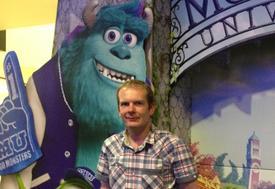Body fat Percentage

chrisoldroyd
Posts: 42 Member
So I just measured my body fat percentage using some Accumeasure 3000 calipers. Results were 22.3%.
Anyone know what that exactly means and how hard it will be to reduce it by 5%. I am 41 year old male, 5ft 7 and currently weigh 72Kg.
Cheers
Chris
Anyone know what that exactly means and how hard it will be to reduce it by 5%. I am 41 year old male, 5ft 7 and currently weigh 72Kg.
Cheers
Chris
0
Replies
-
Don't take the 22.3% number too literally, as there is a big margin of error. Just record the mm's that you measured and track it over time.. perhaps once a week. You can use it to gauge relative progress. The mm's on the calipers going down is a much nicer indicator than the number on the scale going down, since the calipers are more closely correlated to body fat.0
-
Hi the calipers method can be way out to be honest, it measures it by if you can pinch an
inch method which would tell me im hugly over weight! (as i have execss skin (but not hugley over weight) or body fat!
(but not hugley over weight) or body fat!
But if you get some of these new fangled scales that do it electronically it will give you a much more closer to the truth number!
:bigsmile:0 -
Those scales are even worse honestly. Calipers can be quite accurate, but that requires someone trained and experienced to administer the test, and take readings from 5 or more locations. Whereas, when we generally use them at home, per the directions, we only take the single suprailiac measurement, which on its own, is not enough to derive a meaningful body fat percentage.0
-
I agree the scales are inaccurate. I have one at home and it usually tells me my bf is anywhere form 19-21%. Calipers give me 13%. I had a dexascan done it my bf was 12.2% So the calipers were very close.0
-
maybe but my scales always marryup with the hospital and i would give anyone 1000 quid if they could get a good reading off of me with callipers! pro or not!(look at mr.mitchilin man for ideas of me naked!!! ) :noway:
 0
0 -
calipers are reasonably accurate if the person using them gets the technique right. the problem lies in that it's quite difficult to learn to do it correctly.
I'd advise measuring it with 2-3 different methods, and also using visual estimates. Leigh Peele's blog has some good information about that, and a free download all about body fat measurements, how reliable each method is, and lots of pictures for visual estimates.
As has been said, it's hard to get an accurate measurement, but if you use the same method consistently, it's very useful for tracking progress. Ultimately, it's how you look and being healthy that counts, not a number on a calipers or scale. If you're progressing well with lifting (or whatever sport/exercise you do) and you look good in the mirror, then it's highly likely you have a healthy body fat percentage. If you can see your abs, then it's probably about 15% (women) or below 10% (men) regardless of what any device says. And really, who cares because if it's visible abs you want and you have visible abs, does it really matter if your body fat percentage is 14% or 17%? (ditto whatever look you're after)0 -
^^^ Well said
And here is one particular Leigh Peele link, that has an excellent body fat % visual reference
http://www.leighpeele.com/body-fat-pictures-and-percentages0 -
Few things here.
First accuracy. For best accuracy bio tank (whatever they are called) > Calipers > BF Scales though eyes are better than most. By that I mean a weekly or bi weekly photo you can visually see change. But for the numbers yeah, see above. What makes scales bad is they rely on a few different elements to be the same and rely on body hydration to be accurate. Calipers rely on consistency of measuring location and method. Like said with those the important thing is to try and be consistent each time.
As for amount of BF. The images shown in that link are a good reference. Dropping BF% is purely down to shedding fat as calories burned. It takes time though. As you know, you cant spot reduce fat. You cant influence where on your body it burns fat and no single exercise takes fat away from a certain area (so those adverts that say do these 1000 crunches a day on their special machine are rubbish and cons).
Quick maths :
If you are 100kg (easy number to use for example)
If you are 22% BF that is 100 x 22% = 78kg lean with 22kg fat.
A good target is to lose 1-2lb per week. 1kg = 2.2lb.
It is hard to burn fat and retain muscle but it can be done with gradual fat loss (another topic)
So, what you want to do is say burn off 10kg Fat and hopefully only say 2kg lean. Thats a 12kg or 26lb weight loss.
Good time target for that might be say 15-20 weeks on a solid diet and exercise routine.
FYI I've gone from 26% to around 16% is around 24 weeks.0 -
Just read the 72kg you are (at 22%)
so that is 15.8kg fat = say 35lb
If you want to be 17% that would be 12kg = 26lb of fat
So you want to drop 3.8kg of fat (8.3lb)
Id give it 8 weeks, maybe 10 for safety.
Thats based on 500 cal under your TDEE per day.0 -
Skin fold measurement can be accurate but some people store more fat internally than others (visceral fat) - the so called "fat on the inside, thin on the outside".
I use a bio-impedance scale (questionable accuracy but consistent) for tracking and my numbers come out very similar to yours.
I'm going to get a BodPod scan done this month to get a more accurate number.
Just Googled BodPod Newcastle and it looks like there are places you can get this done local to you.0 -
Body fat callipers can be really accurate if done by a well experienced person. They should measure and mark out points on your body and these points should be checked three times over before the calculation is done. Scales are extremely inaccurate. The important thing is that whatever measure you use that the number is going down regardless.
If your body fat was measured as described above then you can take it as relatively accurate. If they just used the callipers with no measurement then I'd find somebody to take it properly.
As far as reducing it. With the right diet and exercise you can expect 0.5% loss a week.
Are the scales accurate? No. They give an estimate and studies have concluded that body fat scales do not give precise readings. Consumer Reports tested body fat scales and found them all to be inaccurate. Factors such as body type, body temperature, hydration, and recent exercise can have a noteworthy impact on the number you see on the scale. They measure body density.0 -
^^^ Well said
And here is one particular Leigh Peele link, that has an excellent body fat % visual reference
http://www.leighpeele.com/body-fat-pictures-and-percentages
Really nice link.0 -
Thanks everyone, that's a lot to take in. Fancy getting a BodPod done but can only find one in Newcastle University and they do not seem to offer them to the public.
Cheers
Chris0 -
Chris,
I work (ed) for Newcastle University and can't imagine that they'd mind if you got in touch to ask if they'd let you use the Bod Pod. I imagine they must use it for clinical studies if you can find it's location (department/school) it's in and email the person (or technical manager) in charge they can only say no can't they.
I worked in the Med school and KNOW we didn't have one (just HEAPS and HEAPS of bloomin students!!!!!!!!!!!!!!):laugh:0
This discussion has been closed.
Categories
- All Categories
- 1.4M Health, Wellness and Goals
- 395.6K Introduce Yourself
- 44.1K Getting Started
- 260.7K Health and Weight Loss
- 176.3K Food and Nutrition
- 47.5K Recipes
- 232.7K Fitness and Exercise
- 446 Sleep, Mindfulness and Overall Wellness
- 6.5K Goal: Maintaining Weight
- 8.6K Goal: Gaining Weight and Body Building
- 153.2K Motivation and Support
- 8.2K Challenges
- 1.3K Debate Club
- 96.4K Chit-Chat
- 2.5K Fun and Games
- 4.3K MyFitnessPal Information
- 16 News and Announcements
- 1.3K Feature Suggestions and Ideas
- 2.9K MyFitnessPal Tech Support Questions








